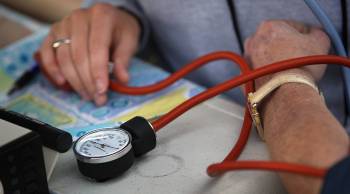Is it <i>really</i> universal health insurance?
Share Now on:
Is it <i>really</i> universal health insurance?
KAI RYSSDAL: Here’s a statistic you’ve probably heard a couple of times. About 46 million Americans don’t have health coverage. That’s obviously terrible for them. But it’s not so good for the health insurance industry, either. So today it came up with its own fix. Curious, considering it was insurers that helped torpedo the last try at transforming health coverage back in the Clinton years. Helen Palmer reports from the Marketplace Health Desk at WGBH.
HELEN PALMER: America’s Health Insurers want the government to create a universal health account so everybody can use pre-tax dollars to buy private insurance. But that’s only part of the proposal. Karen Ignani, of the Health Insurance Lobby Group.
KAREN IGNANI: Many adults still end up in the cracks of our public program. We want to stop that and set a standard to say that public programs ought to cover 100 percent of people below the federal poverty level.
The insurers reckon the government would need to spend $300 billion over 10 years on tax subsidies and grants. That could expand preventive services and cover more children. That’s a great idea, says consumer health advocate Ron Pollack of Families USA.
RON POLLOCK: What I am most encouraged about is that the industry is now saying that there is a real role for public programs like Medicaid and the State Childrens’ Health Insurance program.
Pollack says expanding access to health care needs compromise between people who think the government should do it all and people who say the private insurance market’s the answer. Harvard health economist David Cutler says this proposal is a good start, but he sees some gaps in the insurers’ plan.
DAVID CUTLER: Where this is lightest are on things about cost or things about health care quality.
The insurers say they are looking at ways to cut costs by offering cheaper health plans, though they provided no details. Meantime they plan to devote “significant resources” to selling their new proposals. They’re spending $100,000, just this week, just in Washington D.C.
In Boston, I’m Helen Palmer for Marketplace.
There’s a lot happening in the world. Through it all, Marketplace is here for you.
You rely on Marketplace to break down the world’s events and tell you how it affects you in a fact-based, approachable way. We rely on your financial support to keep making that possible.
Your donation today powers the independent journalism that you rely on. For just $5/month, you can help sustain Marketplace so we can keep reporting on the things that matter to you.


















